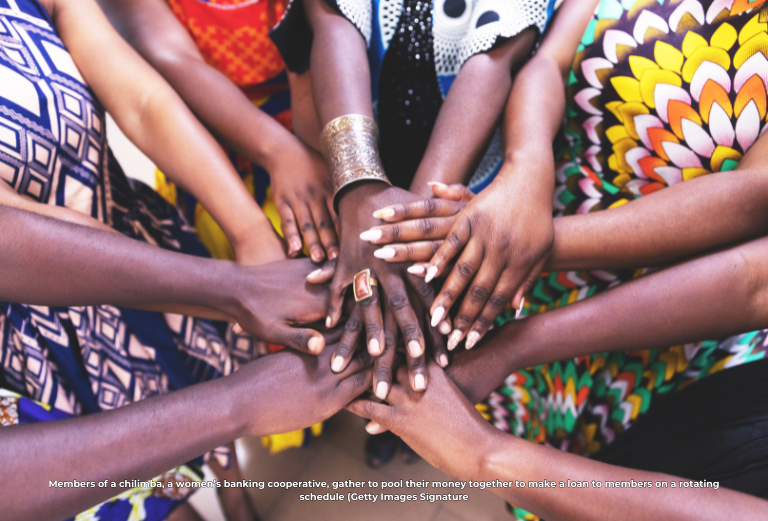Chilimba

Credit: ©Getty Images via Canva.com
| Giver: | Individual |
|---|---|
| Receiver: | Formal/Structured unregistered organizations |
| Gift: | Money |
| Approach: | ROSCA |
| Issues: | 1. No Poverty, 10. Reduced Inequalities, 2. Zero Hunger, 3. Good Health and Well-Being, 4. Quality Education, 8. Decent Work and Economic Growth |
| Included in: | African Philanthropy Narratives |
Introduction
Rooted in centuries-old traditions, Zambia's culture is deeply intertwined with the practice of giving. When Zambia built its first high-learning institution in 1966 called the University of Zambia, it was built through a collective process of giving the little each citizen had – the institution was erected and built by citizen’s collective action. According to the World Giving Index for 2017, Zambia is currently ranked eighteenth in the world and fourth in Africa in terms of giving – and this is even without including organic/traditional giving practices that are based on relations of association, community or affinity.
One important giving practice in Zambia is Chilimba, a Zambian cultural tradition involving a system of reciprocal mutual support, where individuals, often in women-led groups, pool resources into a fund. Members take turns receiving lump-sums based on predetermined criteria thus fostering trust, camaraderie, and social cohesion while serving as a means of poverty alleviation and empowerment within communities.
Chilimba: A Time-Honored Circle of Giving
Chilimba is deeply rooted in Zambia’s culture of collective giving and generosity. Derived from the Bemba language of Zambia, it refers to a system of collective financial assistance, similar to a rotating savings and credit association. In a Chilimba, a group of individuals, usually friends, family members, or community members, agree to pool their resources together to form a pooled fund. Participants decide on a monthly contribution amount, and a designated person, often the group leader, collects the contributions.
Members take turns each month receiving this lump sum based on predetermined criteria, such as financial need or a life event like a wedding, school fees, business, education or medical expenses. Each member continues to contribute regularly, even if their turn has passed, until all members have received an equal amount.
Though there are Chilimba groups that are of mixed gender, most of the Chilimba groups are often women-led, comprising women only. Traditionally Chilimba contributions were collected manually, however, with the invention of digital platforms, collection is often electronic with the use of mobile money.
The Philosophy of Chilimba
Giving in a Chilimba is not seen as a mere transaction but as an act of love, empathy, and solidarity. It fosters a sense of social cohesion and mutual responsibility. Chilimba circles are marked by trust among its members and based on relationships that value reciprocity and solidarity. Chilimbas are, however, organized systems and have agreed upon rules which govern management, transparency and accountability.
The practice of Chilimba significantly impacts poverty alleviation and social welfare within Zambian communities and its philanthropic potential goes beyond community-level projects. Chilimbas are not just for consumptive purposes; they also serve as a source of empowerment and social upliftment for its members. Through this tradition, individuals also gain access to financial resources to help them pursue education, start businesses and develop long-term assets.
Conclusion
Chilimba, deeply rooted in Zambia's culture, exemplifies the nation's profound giving tradition. This communal practice, marked by trust and reciprocity, embodies the spirit of ubuntu, promoting social cohesion and mutual responsibility. In a world where individualism often takes precedence, Zambia's chilimba offers a powerful reminder of the value of community and the collective pursuit of well-being. By preserving this time-honored tradition, Zambia stands as a shining example of the potential for giving to transform lives and strengthen communities.
Contributor: Mwila Chriseddy Bwanga
| Source type | Full citation | Link (DOI or URL) |
|---|---|---|
| Publication |
Chipili Lumpa Mwaba “Reflections on Informal Financial groups and Financial Scandals Surrounding Them”. FsdZambia (2021). |
https://www.fsdzambia.org/reflections-on-informal-financial-groups-and-financial-scandals-surrounding-them-how-to-know-what-you-can-trust/ |
| Publication |
Nost Babara, Jangara Tarisai and Likumbi Kapihya “Beyond Giving Study of Local Philanthropy in Zambia” Research Paper published by Zambia Governance Foundation (2018). |
https://knowledgehub.southernafricatrust.org/site/assets/files/1885/beyond_giving-_local_philanthropy_study_in_zambia.pdf |
| Private Communication |
Mwaaba Christine “Construction of UNZA should inspire Patriotism” Published by Times of Zambia (2015). |
https://www.times.co.zm/?p=55482 |
| Publication |
Mumba, Munji L., and Mukosha Chikuba. “The Role of Chilimba Societies in Enhancing Economic Development among Women Entrepreneurs: A Case Study of Kabwata Women Entrepreneurs.” International Journal of Business and Economic Development 2, no. 2 (2014): 47-62 |
- |